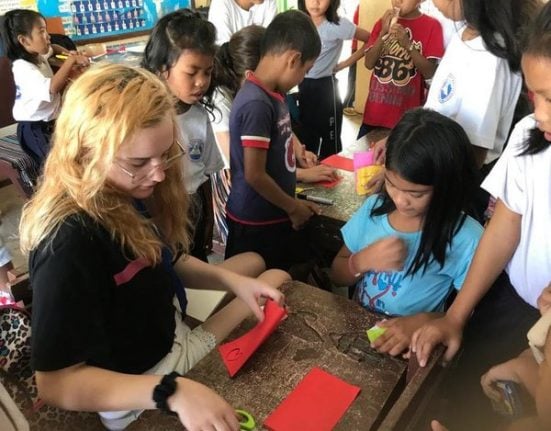Knowing the negative impacts of coronavirus on the poor and vulnerable, the children of Futuraskolan International are determined to make a difference. Their efforts range from new ways to keep up social contact with Stockholm’s elderly to providing meals for school children in the Philippines.
Futuraskolan, where teaching is done in English and Swedish, promotes an international mindset and a desire to actively contribute to the wider world. Its dynamic approach to personal development is encapsulated in its community outreach activities and Global Citizenship Project.
Hands up if you want to help
Futuraskolan is a network of seven pre-schools and seven international schools in the greater Stockholm area for children up to the age of 15. Around 3,000 children attend Futuraskolan, which has three core values: progressiveness, energy and respect.
Progressive thinking: find out more about the core values that set Futuraskolan apart
Since the coronavirus outbreak began, the children and their teachers have put into practice a host of inspirational ideas to help groups short of technology, food, and social contact.
“We want our children to feel they can make a difference, so they will act,” says Ferdie Sevilla, Principal of Futuraskolan International Gåshaga and Director of the Global Citizenship Project.
“With the right skills, they can withstand difficult situations. We give them the opportunity to think for themselves and ask them not to be afraid to share their ideas.”
It’s a lesson even the youngest have taken to heart. Before coronavirus, Futuraskolan preschoolers would visit nearby elderly homes twice a month.
Saddened at having to cancel the trips, the children came up with alternative ways of staying in touch. A video of the children singing You Are My Sunshine was sent to brighten up the senior citizens’ time in isolation, and they’ve also received children’s paintings.

Futuraskolan has also taken steps to give grandparents of students sanitized computers or iPads set up for them to easily join video meetings with their grandchildren. One teacher also ordered and arranged installation of modems and computer units for local families lacking home internet.Photos: Futuraskolan
Futuraskolan’s efforts with technology have even stretched to sending a 3D printer to a new Stockholm field hospital to make visors for healthcare staff. “The children were very sure we should lend it out and very proud that we could help,” says Ferdie.
Interested in international and bilingual schooling in Stockholm? Find out more
Let’s Dance! Day with TV star boosts kids’ energy
Creativity plays a big part in helping the children adapt to these times without becoming distracted. Some students have benefited from morning yoga sessions or having art lessons outside.
Children were also delighted by a ‘dancing day’ Ferdie organised where they met a star from the hit TV show Let’s Dance. “We could see the positive energy it generated,” he says.
Younger children also quickly took up the challenge of thinking of new ways to greet each other while ensuring physical distancing. Some designed floor markers or signs to help maintain spacing when they arrive in the morning and at lunchtime.

One class created a “halo hand” method – putting your arm out straight with your hand in the air over the shoulder of the person in front – to ensure nobody gets too close while standing in line.
Children have also been encouraged to get outside and think about the environment. Some have been busy cleaning up parks, recycling found items, planting flowers, and hanging bird houses.
Seeking to build a better future doesn’t mean forgetting the past. A ‘Living History’ website created by a Futuraskolan librarian is recording students’ entries about their thoughts and feelings as they live through this period.
“This is a nice idea to celebrate the good that is happening,” says Nicole MacDonald, Principal of Futuraskolan International School of Stockholm.
Local school, global impact
Ferdie set up the Global Citizenship Project four years ago after a volunteering trip with a colleague to the Philippines, where he grew up. It now plays a central role in Futuraskolan’s vision to be “the best stepping stone for future world citizens”.
Children in Stockholm stay in touch with five schools in the Philippines and hold regular Skype meetings with their counterparts. Earlier this year, Ferdie took students on a trip to the Southeast Asian country that encompassed leadership training, learning exchange and a meeting with the Swedish ambassador to the Philippines.

“Students raised funds before they went and then decided what to do with them based on their observations on the trip,” he said. “In this way, it’s not only about empathy but also about planning actions to help in a sustainable way.”
Futuraskolan’s students have made sure that 80 of the “poorest of the poor” Filipino students have been able to get meals at school. They are now considering also helping families to cultivate crops at home.
“Our students and staff are making great collective efforts,” says Tom Callahan, CEO of Futuraskolan. “They’ve done some deeply inspiring things to respond to the coronavirus situation with purpose and help communities through this time.”
That’s a vital life lesson for all of us – and one the children of Futuraskolan already know.
This article was produced by The Local Creative Studio and sponsored by Futuraskolan International.



 Please whitelist us to continue reading.
Please whitelist us to continue reading.